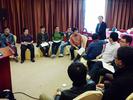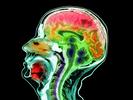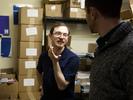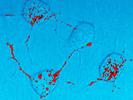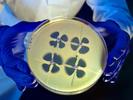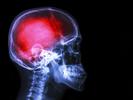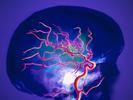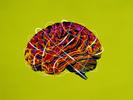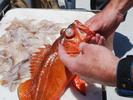Jon Hamilton appears in the following:
Sushi Science: A 3-D View Of The Body's Wasabi Receptor
Wednesday, April 08, 2015
The same receptor on nerve endings that makes sinuses tingle when we eat wasabi plays an important role in the pain of inflammation. The first 3-D view of the receptor could lead to better pain drugs.
Hackers Teach Computers To Tell Healthy And Sick Brain Cells Apart
Tuesday, March 31, 2015
Scientists are still better than computers at assessing a neuron's health by looking at its shape. But an effort that includes an international series of hackathons could help speed the process.
No Easy, Reliable Way To Screen For Suicide
Tuesday, March 31, 2015
Clinicians correctly predict a suicide attempt about half the time — no better than a coin toss. Certain tests of involuntary responses, although still experimental, aim to improve the odds.
University And Biotech Firm Team Up On Colorblindness Therapy
Wednesday, March 25, 2015
Six years ago, husband-and-wife scientists used gene therapy to cure colorblindness in monkeys. Now they're trying to make it work for the millions of people with faulty color vision.
Many Doctors Who Diagnose Alzheimer's Fail To Tell The Patient
Tuesday, March 24, 2015
Only about half of Medicare patients are told of the diagnosis by their doctor, a study finds. That compares to 90 percent of patients diagnosed with cancer.
Clues To Autism, Schizophrenia Emerge From Cerebellum Research
Monday, March 16, 2015
The brain's cerebellum helps shape thinking and emotion, as well as physical coordination, research shows. Could stimulating that part of the brain help ease some aspects of autism and schizophrenia?
A Man's Incomplete Brain Reveals Cerebellum's Role In Thought And Emotion
Monday, March 16, 2015
Jonathan Keleher is one of a handful of people known to have lived their entire lives without a cerebellum. His experiences are helping scientists show how this brain structure helps shape who we are.
Mad Cow Research Hints At Ways To Halt Alzheimer's, Parkinson's
Monday, March 09, 2015
Corinne Lasmezas began her career studying a disease that destroys the brains of cattle. Now she's using what she learned to search for drugs that can stop human brain diseases.
Why The 'Nightmare Superbug' Isn't As Scary As It Sounds
Friday, February 20, 2015
The "nightmare superbug" that contributed to two deaths in California isn't as scary as it sounds. But the outbreak does highlight a growing problem with drug-resistant germs.
Why California's Superbug Outbreak Isn't As Scary As It Seems
Thursday, February 19, 2015
News reports are describing a "nightmare superbug" killing people in California. But scientists who study infectious diseases say the risk from this outbreak doesn't live up to the alarming headlines.
"It's not something that is likely to spread around the community or is a cause for alarm," says David ...
Pain Really Is All In Your Head And Emotion Controls Intensity
Wednesday, February 18, 2015
Humiliation, fear and unpredictability all turn up the volume on pain, research shows. And meditation can turn down pain's intensity, according to scientists who are starting to figure out why.
Beyond BPA: Court Battle Reveals A Shift In Debate Over Plastic Safety
Monday, February 16, 2015
In 2007, a plastic called Tritan became a hit, partly because it was free of the chemical BPA. Then a competitor began suggesting that Tritan products contained other chemicals that act like estrogen.
Once A Vaccine Skeptic, This Mom Changed Her Mind
Wednesday, February 04, 2015
Juniper Russo wants what is best for her daughter Vivian, and she sometimes questions mainstream medicine. But after three years of soul searching, she decided what was best was vaccination.
Leaky Blood Vessels In The Brain May Lead To Alzheimer's
Friday, January 23, 2015
As vessels become more porous, researchers say, they allow toxins in the bloodstream to reach, and damage, delicate brain cells and raise the risk for dementia.
From The Mouths Of Apes, Babble Hints At Origins of Human Speech
Wednesday, January 14, 2015
You say banana; this orangutan says ... well, it's hard to tell what she's saying. But the rhythmic, speechlike sounds of the zoo-dwelling ape have started scientists talking.
Brain Scans May Help Predict Future Problems, And Solutions
Wednesday, January 07, 2015
Brain imaging can help researchers tell if people are more likely to be able to quit smoking or have trouble with reading. But those tests aren't yet ready for the doctor's office or classroom.
How Anglers Are Learning To Save Fish That Get 'The Bends'
Tuesday, January 06, 2015
Millions of deep-water fish die every year because of barotrauma, a condition divers know as "the bends." But scientists say descending devices can help fish survive a trip to the surface.
A Family's Long Search For Fragile X Drug Finds Frustration, Hope
Monday, December 22, 2014
There is no effective treatment for the rare genetic disorder fragile X syndrome, so two parents created a foundation to fund research. But they found there's no easy road to a cure.
A Crowd Of Scientists Finds A Better Way To Predict Seizures
Wednesday, December 10, 2014
An online contest for data scientists has produced a great leap forward in efforts to predict when someone with epilepsy is going to have a seizure. The winning team used data on electrical activity in the brain to develop an algorithm that predicted seizures 82 percent of the time.
That ...
Microsoft Co-Founder Gives $100 Million To Research Roots Of Cancer
Tuesday, December 09, 2014
Billionaire Paul Allen's new institute in Seattle will examine how the cells in your body work — and how and why they malfunction, leading to tumors, Alzheimer's and other diseases.


